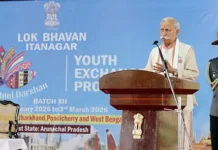Monday Musing
[ Amar Sangno ]
The tribal way of life and beliefs is as fascinating as its judicial system. Certain ancient practices, such as dingdung and sori, in the Nyishi community are still thriving when it comes to seeking the ultimate truth and justice, defying all religious boundaries.
Dingdung is a traditional oath-taking system, and sori is a traditional binding (as in promising) ritual. They have different literal meanings, depending on the situation in which they are practiced. This practice is prevalent in East Kameng, Kurung Kumey and Kra Daadi districts, especially in dire cases, and during elections. The practice is the ultimate way of testing truthfulness.
Surprisingly, some sections of the Christian community in the three Nyishi inhabited districts still follow this practice in dire cases.
A few weeks ago, I had the privilege to attend a cow theft case at the general ground in East Kameng HQ Seppa, which had been heard by the local council, called Nyele or Yalong (in Seppa Nyishi). Traditionally, the representatives of the accused who committed the crime have little to argue for and must submit to the ritual.
The missing cow had been found alive in the village of the accused, 25 kilometres away from Seppa township. When the cow was found, the accused sent an emissary to the animal’s owner, seeking an amicable settlement. The settlement ended with a fine imposed on the accused, and at the same time the accused was subjected to dingdung to ensure that he hadn’t stolen any other animal.
The accused and his representatives complied with the terms. The fascinating thing about the settlement was that the majority of the representatives involved were Christians, showing that this ancient practice of seeking the truth and justice is very much alive.
“In dingdung, generally it is taken with certain objects such as water, fire, iron, or stones, and sometimes with parts of animals and other things which can cause extreme harm, even death, in case of failure,” explained Donyi Polo Cultural and Charitable Trust Secretary Pai Dawe.
Dawe further explained that the priest invokes the spirit of the objects with which the dingdung is taken, and addresses them to Chwjwng Jwngtene (the deity or goddess of truth).
“The priest ensures that if truth prevails, there shall not be any harm; but if truth is defeated, the spirit of the objects can award punishment, even taking the lives of the accused or the suspect” he added.
Arunachal Christian Forum president Tarh Miri said: “For me, it has nothing to do with belief or practice, but this is because of the circumstances and compulsion of our society in dire cases. This practice is neither superstitious nor scientific.”
Seppa-based Government Degree College Principal Dr Robin Hissang, who wrote a PhD thesis on ‘Working of Judiciary in Arunachal Pradesh: Interface of Traditional and Modern Judicial Institutions’, said that he believes that “for the believers of Donyi-Poloism, dingdung-sori was one aspect of justice delivery system in the olden days, but it is still followed.”
Dr Hissang agreed that traditional or ritualistic ways of seeking the truth and ensuring justice do have their pros and cons, compared to the modern judiciary, “but they are still well-grounded in the society and are effective.”
“Even followers of other religions have faith in this concept and use this traditional dingdung and sori as and when required, in order to deliver justice for establishment of peace and tranquillity in the society,” he said.
However, certain sections of the society consider this practice a taboo and a social vice, and are strongly advocating abolishing it, According to them, dingdung is not a logical solution to any dispute but is a “forced and coerced” justice system.
Former ACF president Toko Teki argued that dingdung or sudung is “a cruel practice of seeking justice and truth, and it should be abolished from the modern society.”
“In today’s modern world, modern justice system is available for redressal of any wrongdoing to any citizen. In addition to the court system, we have our local kebang or male or nyele system, where we resolve our issues through customary laws,” Teki said.
“We have abolished cruel practices such as child marriage and enslavement of wrongdoers. Dingdung or sudung is a harsh and cruel practice. It should be completely done away with. It has no reasonable or logical basis to continue in this modern world,” he added.
Some beliefs are beyond religion and science. Despite the advent of modern justice delivery system and Christianity, the ancient practice of dingdung and sori as part of Donyi-Polosim still thrives.

